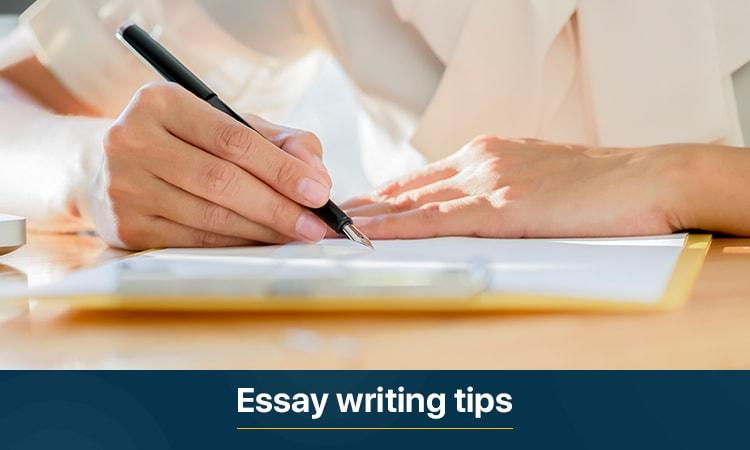
10 Tips for Writing a Good Essay
You woke up this morning and thought "I'm going to do my paper today" but don't know where to start? Most students experience this struggle and eventually develop negative feelings towards academic writing. However, this activity is by far not as intimidating as it might seem. The key to getting successful in writing is to get enjoyment from doing it. You might ask how? Let's look deeper into this question.
Why Might Writing Become Difficult?
The problem of writing is not in the process itself but in the way we approach it. There are a few underlying causes that lead to writing becoming tedious. First of all, we're too dependent on the Internet and everything it offers. Once you sit down and think "time to do my paper today", you quickly get distracted by the desire to check your phone, scroll down Facebook or watch one short episode on Netflix.
Another issue is that most people write essays only to make the grade instead of producing an actually interesting and useful piece of writing. This also concerns people who adjust their writing to what they expect would be approved by the teacher. Finally, most look for a way to write an essay in the shortest time possible and do little work.
These predispositions already set your mind for a certain outcome - a tiring process of writing without a clear initial aim. When you focus only on the external conditions, you forget to pay attention to what you're doing in the first place - writing per se. Your subconscious gets locked on the idea of a satisfactory result instead of the ideas you could use. That's how a student version of the writer's block is being born.
That's why the first step to writing a good essay is stopping trying to write a good essay. Sounds ridiculous but bear with us. Instead of focusing on the adjective "good", attempt to write interesting because in the end, no one is going to argue that an interesting essay is a good one. In order to make it "better" according to your professor's expectations, you can always edit the essay after you've written it but never start writing with these things in mind. This is the key to start enjoying writing, but we've also promised tips for developing your writing skills. Here they go.
1. See Your Essay as a Book
What makes a good book? Most avid readers will answer that it boils down to a complex conflict and a surprising turn of events. Even though an essay is an academic type of writing, these features will also make it successful. The conflict will find its representation in a collision of different ideas while the surprise happens when you convince the reader of something new. More about how to manage this see in tip 3.
2. First Step Is not the Research but Finding the Fun Part
As we've mentioned earlier, a good essay is the one that you have fun writing. So before you get down to composing it, think about how you can get a blast throughout the process. It's often very difficult to find the motivation to do something that might seem tedious so you need to trick your mind into thinking that it's the opposite - fun and exciting. Once you start thinking how to make it more enjoyable, your subconscious will kick in and start coming up with the ideas. You can also implement this practice asking yourself a question "What can I do to finish it as fast as possible?" Just trust your mind and it will do wonders.
3. Look for Surprising Information
Remember the tip about a conflict and a surprise? It can be achieved on your research stage. You might be tempted to stick to well-known facts because they are always a safe choice and it cannot go wrong with them. However, this decision will cost you both the enjoyment of writing and the quality of the outcome. So when you research your topic, pay close attention to all information that strikes you. If you can't find anything interesting, we'll have to disappoint you because it simply means that you're not looking good enough. Whatever you pick, whether it's literature or chemistry, history or math - there are always surprises. All discoveries have been built on debunking previous misconceptions, and researching for an essay means finding that element of surprise.
4. Too Much Information? Five Sentences Will Do
Of course, you can't write an academic essay with five sentences but you can still build its core in such manner. In reality, most information you want to say will always already be mentioned in those five top sentences that create the skeleton. The rest is just muscles and skin - your arguments to support the ideas you promote. These five sentences are your thesis, three body sentences of your main paragraphs and a conclusion to sum everything up. Once you have those, you just need to write accompanying information about them to make them stronger, and your essay is done.
5. It's All about the Sources
Now, this trick is something you should be careful with because you can always encounter professors who will frown upon using a lot of sources. However, it should still work out in most cases. There has already been said so much about your topic (and in a more skillful way) so why not to use those quotes. What you need to do is to find as much information as you can to put in your essay and refer to your sources or paraphrase them in your own words still citing the original. Pay attention that we really want to highlight here the "referencing" part because no way are we going to advise plagiarism. The trick we're describing will just make your essay "source heavy" but still your own.
6. Don't Go in the Order
As we all know, every essay follows the introduction-body-conclusion structure. However, writing following this order ends up being difficult for many. What you can do is shake things up and write the introduction after the body. It will give you a better insight because you'll already have enough written to sum it up instead of predicting how your essay will go.
7. From What to How
The best essays are the ones that answer the question "how" instead of "what". That's why if you're struggling with writing an argument, start it with a "how". For example, "How did the author achieve...?", "How has the situation changed over...?", "How does this affect...?" etc. Following this tip will give you a much bigger perspective to write from and a wider ground to cover.
8. Avoid These Words
There is a number of words that make academic writing messy. It doesn't mean that they should never be used in writing, these words are perfect for blog posts and this one is a perfect example because you'll find them used widely throughout this text. But try to reduce them in an essay to avoid the negative impression. These are the words:
- you;
- a thing or things;
- some;
- that.
You might say that it's difficult to write a text without these words, but that's the feature that distinguishes academic writing from less challenging types.
9. Let Yourself Wander
It's often hard to keep your thoughts aligned and write them down in a way that makes perfect sense. Don't pressure yourself to do so when writing a draft. It's perfectly fine to jump around and write ideas whenever they cross your mind. The editing step is specially designed for bringing everything in order and making your essay have a smooth flow.
10. Wikipedia is Your Friend and Enemy at the Same Time
Even though most professors refuse to acknowledge Wikipedia being a reliable source, there are still ways you can use it and be sure that you have valid data. First of all, it's a useful place to go if you're completely oblivious to what you're writing about. Wikipedia usually has short enough summaries that can at least give you an idea what it's all about. Secondly, the reference section of this website is your main friend. While you wouldn't want to cite Wikipedia, there you can still find many original sources that will create a much better impression (as long as they are valid).
Hopefully, these ten tips will help you to find joy in essay writing and make the process ultimately more successful. Remember that pursuing education is a privilege many people in the world are deprived of so don't take it in vain.
